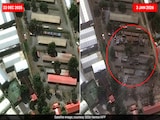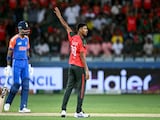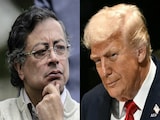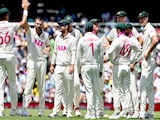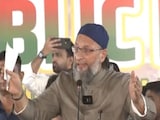- India has set a target of inoculating 30 crore people by July
- The mission is reportedly progressing at slow pace, according to many
- By April, the drive will move "very very" fast, says NITI Ayog member
India has set a target of inoculating 30 crore people against Covid-19 by July. For various reasons, however, the mission is reportedly progressing slower than expected, according to many. Yet, the Centre is confident that the process is bound to accelerate and widen with time, making the target achievable.
Nearly three weeks into the massive vaccination drive, the daily numbers have been seen dipping: Last week, the figure dropped from 5.7 lakh to 1.8 lakh a day. The number of average beneficiaries per site, too, fell from 57 to 49 over the past few days, according to government data released yesterday.
India is still a little short of reaching the 50 lakh mark (49,59,445) but the Health Ministry today issued a global graph on how India is the fastest nation to reach that mark - in 21 days - while the US took 24 days, the UK 43, and Israel 45. Meanwhile, public health experts said the country needs to do a lot more to achieve its target.
Today, Kiran Mazumdar Shaw, the Executive Chairperson Bengaluru-based Biocon, Asia's largest biopharmaceutical enterprise, tweeted recommending institutional vaccination to ramp up the numbers.
Citing media reports in another tweet, she struck a cautionary note: "We have a narrow window to do mass scale vaccination n avoid a third wave that can happen with variants."
One of the reasons cited for the reported slow progress of Covid-19 vaccination, despite the availability of shots, in India was the reluctance among people to receive them, dogged by safety concerns.
The Centre is, however, not too worried about the pace of progress.
"The process of escalating the speed and the bandwidth of candidates for vaccination is happening consistently. For the last couple of days, frontline workers are also being vaccinated," said Dr VK Paul, NITI Aayog member in charge of health.
"This is now running into several thousand vaccinations already being given. Very soon, yes, individuals above the age of 50 years will also be brought in and all the three waves will, perhaps, be at some stage moving together," Dr Paul told NDTV in an interview yesterday.
He said some spare stockpile of vaccines seen at this stage was likely a result of the fact that the rate of two doses-per-individual at which the drive is progressing to cover 30 crore people is happening within "a finite period of time".
"We have to look at the overall availability over six-to-eight months and then talk about whether we have a spare stockpile or not…it looks as if we have spare doses, but come April or so when the speed of vaccination will be very, very high, there will be narrowing of this gap and eventually, there will be no gap at all," he said.



